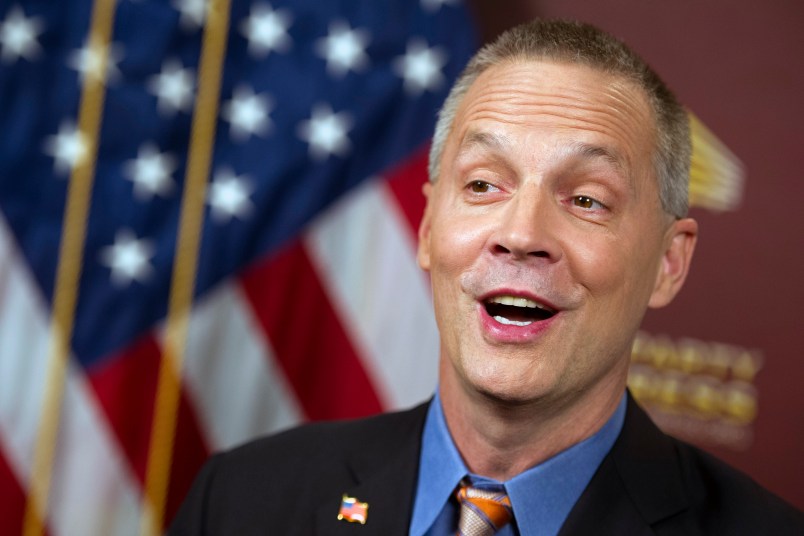WASHINGTON (AP) — A multimillionaire, first-term Florida congressman flipped shares in a solar company the same day he acquired them in an initial public offering, despite a federal law that generally prohibits members of Congress from participating in IPOs.
Republican Rep. Curt Clawson, who gave the tea party’s response to the president’s State of the Union address earlier this year, earned less than $700 profit on the sale of less than $15,000 in shares of SolarEdge Technologies Inc. of Fremont, California, according to financial records and Clawson’s spokesman, David James.
And James says the trade on March 26 was lawful. “We feel like every requirement of the law was met,” he said Thursday.
Despite the small stakes, however, the trade may test a provision of a 2012 law, the Stop Trading on Congressional Knowledge Act. Known as the Stock Act, it was intended to prevent members of Congress and legislative employees from using inside information or profiting in unseemly ways. One provision bans lawmakers and staff members from buying stock during initial offerings unless the same opportunity is “available to members of the public generally.”
The House Ethics Committee has twice formally reminded lawmakers that the general public is rarely allowed to participate in IPOs, and it advises members of Congress to ask its advice in advance to determine whether such a purchase by them would be permissible.
Investment banks and brokerages traditionally reserve IPOs for their favored customers.
“IPO allocations are candy (that) banks occasionally hand out to their most profitable customers,” said Jay Ritter, a professor of finance at the University of Florida who studies IPOs. “This allocation would not have been available to the general public.”
Clawson’s spokesman, James, told The Associated Press that the opportunity to invest in SolarEdge’s initial public offering was available to any investor with an account at the same brokerage as Clawson.
“It has ‘public’ right there in the name,” James said.
SolarEdge’s IPO price was $18, but the first public trading price was $20.05. Shares peaked that day at $21.89 before closing at $20.70. It was not immediately clear at what price Clawson sold his stock. It opened Thursday at $26.16.
James declined to say whether Clawson sought permission from the House Ethics Committee or to identify which brokerage firm Clawson used. At least one of the banks managing the SolarEdge IPO, Goldman Sachs of New York, does not generally accept brokerage clients who have less than $10 million in liquid assets. Clawson’s net worth is estimated at $26 million. He is a former auto parts industry executive and Purdue University basketball star who was elected in June to replace Rep. Trey Radel, who resigned from Congress after his conviction for cocaine possession.
In a previous case, Rep. Beto O’Rourke, D-Texas, acknowledged in November 2013 — 11 months after he was elected — that he accepted IPO investments offered by his stock broker. O’Rourke said he was not familiar with the rules. The ethics committee closed the case after O’Rourke acknowledged he may have violated the law and followed the committee’s advice to sell his remaining shares. He surrendered his $7,136 profit to the U.S. Treasury.
Clawson’s and O’Rourke’s stock sales were first noted by Legistorm, a Washington-based commercial service that compiles information about members of Congress and their staff members. Clawson’s trading was listed as an IPO trade on a “periodic transaction report” he filed with the House clerk’s office on April 23.
Under the Stock Act, the House Ethics Committee and the Securities and Exchange Commission can investigate alleged violations, said Robert Walker, former chief counsel for the House and Senate ethics committees now in private practice at Wiley Rein LLP. Walker said it was “at best an open question” whether access through a lawmaker’s brokerage would satisfy the requirement that such deals are available to the public generally, and he said rules should be clearer.
“If you weigh the potential return of the investment versus the hassle of the disclosure and review process, the Stock Act has put some strict limits on what’s practical,” he said.
___
Online:
Stock Act: http://www.gpo.gov/fdsys/pkg/PLAW-112publ105/pdf/PLAW-112publ105.pdf
House Ethics Committee guidance:https://ethics.house.gov/sites/ethics.house.gov/files/Stock%20Act%20Pink%20Sheet.pdf
Congressional Research Service report on law: https://www.fas.org/sgp/crs/misc/R42495.pdf
Copyright 2015 The Associated Press. All rights reserved. This material may not be published, broadcast, rewritten or redistributed.







Well gee, if he only got a 4.6% return on his investment in a single day, it’s hardly worth noticing. (rolls eyes)
Typical Republican. “Rules for thee, but not for me!”
IOKIYAR
Same as it ever was.
Typical Tea Party thinking: it’s not the rule that matters, just the investment return.
Very similar to the basic Republican precept: breaking the law only matters if you get caught.
It is much more likely that he got IPO shares because he had a large account balance than because he was a member of Congress.
Still, IPO shares that are “available to the public generally” are almost always ones you shouldn’t buy.
I would say that, if the broker (or anyone further up the chain to the underwriting investment bank) who made the shares available exercised any discretion in deciding who they would offer shares to, the purchase would be a violation of the law.
Clawson should look for a less-smarmy spokesperson.